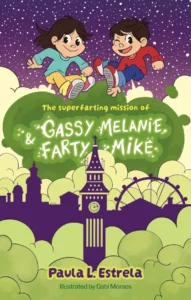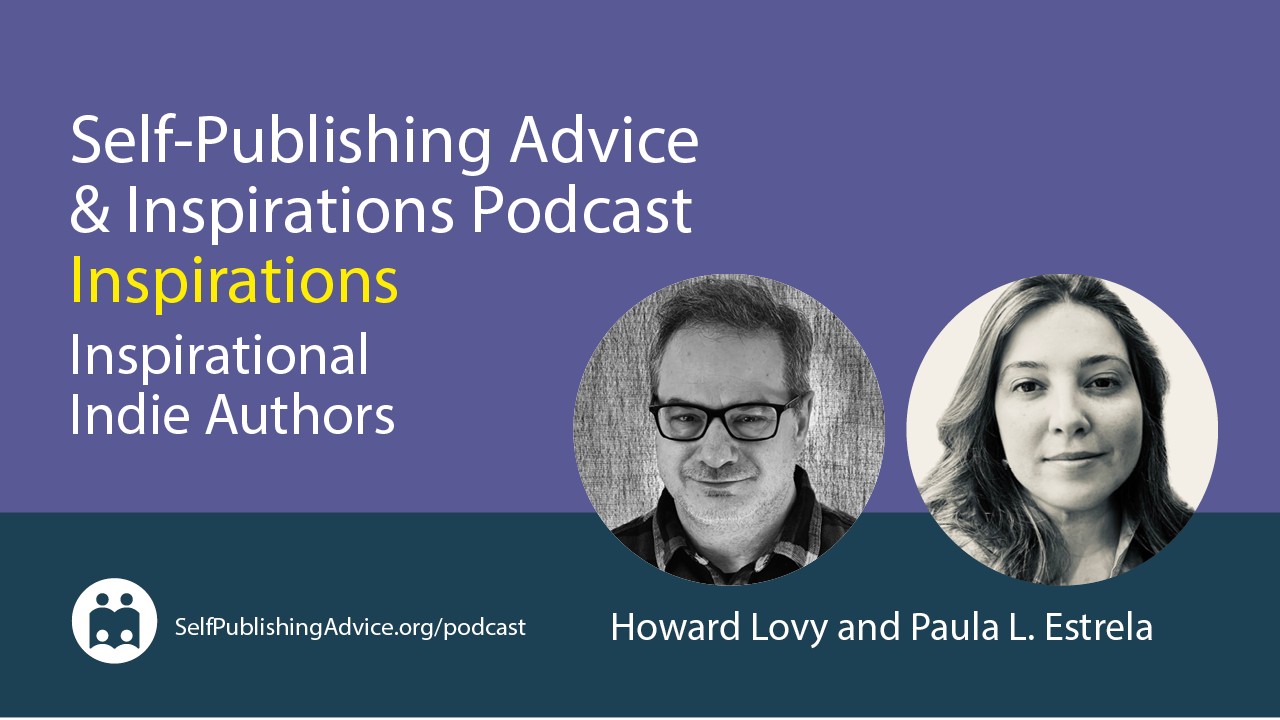My ALLi author guest this episode is Paula L. Estrela, who was born in Brazil and now lives in the UK. She initially came to London as an architect to help set up venues for the Olympics. Now, she's an author who constructs tales for children that also contain important messages.
 ALLi's Inspirational Indie Author Podcast stream is sponsored by Kobo Writing Life, a global, independent ebook and audiobook publishing platform that empowers authors with a quick and easy publishing process and unique promotional opportunities. To reach a wide readership, create your account today! Thank you, Kobo, for your support for this podcast.
ALLi's Inspirational Indie Author Podcast stream is sponsored by Kobo Writing Life, a global, independent ebook and audiobook publishing platform that empowers authors with a quick and easy publishing process and unique promotional opportunities. To reach a wide readership, create your account today! Thank you, Kobo, for your support for this podcast.
Find more author advice, tips, and tools at our Self-Publishing Author Advice Center, with a huge archive of 2,000+ blog posts, and a handy search box to find key info on the topic you need.
We invite you to join our organization and become a self-publishing ally, if you haven’t already. You can do that at allianceindependentauthors.org.
Listen to the Inspirational Indie Author Interview: Paula L. Estrela
On the Inspirational Indie Authors podcast, @howard_lovy features Paula L. Estrela, an architect who builds humorous children's stories with a message. Share on XDon't Miss an #AskALLi Broadcast
Subscribe to our Ask ALLi podcast on iTunes, Stitcher, Player.FM, Overcast, Pocket Casts, Spotify or via our RSS feed:
Inspirational Indie Author Interview: Paula L. Estrela. About the Author
 Paula L. Estrela was born and raised in Brazil. Paula, an architect by training, moved to the United Kingdom in 2008 to work at the Olympic Games. With a passion for books, Paula always wanted to explore new ways of expressing her creativity. Writing books has always been a dream. When her young children started asking for original bedtime stories, Paula began creating characters and adventures to entertain them. This is how Gassy Melanie and Farty Mike were born. After months of research into independent publishing, Paula's first book was published. Paula has written several stories with different scenarios and characters and intends to continue publishing her books and sharing her stories with children of all ages.
Paula L. Estrela was born and raised in Brazil. Paula, an architect by training, moved to the United Kingdom in 2008 to work at the Olympic Games. With a passion for books, Paula always wanted to explore new ways of expressing her creativity. Writing books has always been a dream. When her young children started asking for original bedtime stories, Paula began creating characters and adventures to entertain them. This is how Gassy Melanie and Farty Mike were born. After months of research into independent publishing, Paula's first book was published. Paula has written several stories with different scenarios and characters and intends to continue publishing her books and sharing her stories with children of all ages.
About the Host
Howard Lovy has been a journalist for more than 35 years, and now amplifies the voices of independent author-publishers and works with authors as a developmental editor. Find Howard at howardlovy.com, LinkedIn and Twitter.
If you’re a published indie author who would like to be interviewed by Howard for the Inspirational Indie Authors podcast, you need to be a member of the Alliance of Independent Authors.
Then contact Howard, including your membership number, explaining why you’re an inspirational indie author and what inspires you.
If you haven’t already, we invite you to join our organization.
Read the Transcripts — Inspirational Indie Author Interview: Paula L. Estrela
Howard Lovy: My guest this episode is Paula L. Estrela, who was born in Brazil and now lives in the UK. She initially came to London as an architect to help set up venues for the Olympics. Now she's an author who constructs tales for children that also contain important messages. I'll let Paula L. Estrela tell her story.
Paula L. Estrela: Hi, my name is Paula L. Estrela. I'm a children's author. I absolutely love telling and creating stories and characters and fantasies and adventures for children. I started creating them for my children a few years ago, and now I'm turning them into books to share with the world.
I'm from Brazil, so I grew up in Rio de Janeiro. I always, of course, loved reading books and get completely transported to the stories. I always wanted to be an author, but for most of my life, and actually what I trained to be was an architect. I'm an architect by training and that's my main work. However, I always did some writing in the background. I always created stories and made notes, and it wasn't until a few years ago, probably something like eight years ago, I started collecting these notes and these stories and writing them down.
Howard Lovy: But before Paula began writing, she turned a fascination with how things are built into an architecture career.
Paula L. Estrela: I remember when I was a kid and, as kids, we always draw houses; everyone drew the little house with a chimney in the front of the house. I always drew the plants, I always tried to imagine how the house would be inside.
How do you get in? What do you see? What rooms do you have? Is it two floors or one floor? And I remember asking someone one day when people asked me, what are you going to do when you grow up? And I said, who are the people that draw and define the houses, how they are going to be?
Then someone told me, ah, an architect. Since then, and I was probably eight years old, I always wanted to be an architect. So, that's what I ended up being. Although I don't work with residential architecture, I work with sports architecture. I mainly do sports events. I've been involved with Olympic Games, Commonwealth Games, Pan American Games.
So, I prepare the venues, the installations to receive the event. So, we use a bit of temporary infrastructures to add to the existing infrastructure if there's an existing, because sometimes it's all temporary. So, basically that's what I do.
Howard Lovy: Paula worked for the Olympics in London, helping design venues. Then more job opportunities came up in the UK and she stayed and began to raise a family.
Paula L. Estrela: One thing led to the other. I was then hired for another company as a consultant and then from that company I moved to another one, and here I am still 15 years on. I'm still here and my children were born, I have twins, they were born 10 years ago, almost 10 years ago.
As I said, I always wanted to write as well. I always wanted to create stories. The first time I attempted to create a story, I was 10. I remember with a neighbour of mine, she had a typewriter, and we started writing a book together. I don't know what happened to it, to be honest. We never finished. It's funny, but I always had that in my head that I wanted to create stories and write stories.
When my children were small, they used to love, of course, for me to tell them bedtime stories, and then I started creating characters.
Instead of reading only stories, sometimes I would just create, and that's how I created the characters of this first book that I just published, Gassy Melanie and Farty Mike. So, they were twins that had super farting powers. It's very funny, but it's interesting and the kids would love that.
So, I started every night, they would say, tell me an episode of Gassy Melanie and Farty Mike, and I would say, oh, they were coming back from school and there was a cat stuck on a tree and they, with a fart and a jump, they went to the tree and saved the cat, and things like that. That's how I started creating the stories and the characters.
Then of course later on, I had to give better shape to this, how did they come about, what happened to them to acquire those powers, and I added as well a bit of a message to it, because I don't know if you had the chance, probably not, of reading the book, but there's a whole a positive message for not only saving the environment, that's the key mission that they have in this book, but also about the inner power that everyone has to think positive, positive vibrations can be contagious, and everyone can do it, everyone has the power.
Howard Lovy: Paula found that her kids responded better to stories she made up for them.
Paula L. Estrela: They started asking me, create a story for me, and they started to enjoy much more the things that were created for them because then they would participate on what was happening, where the story was going all the time.
I remember there was another story, I didn't write that one down, but we talked about dragons that have different colours, and each one had a tower, and they would intervene in the story and change the ending of the time, and I think that was more fun for them than simply reading something that was there already.
Howard Lovy: In a way, Paula's career in architecture prepared her to become an author.
Paula L. Estrela: I think the two things in architecture for me that are very strong, and I think it's the same for writing, is of course the creativity, the capability of imagining something new, but also, I think the ability to transport yourself to a different place that is not there, at least not yet.
So, as an architect, I think the main thing, when you are creating a space, when you are designing a space, you have to imagine yourself in there so you can do it properly. In my opinion, at least. I think you need to imagine, if I'm there, how would I like it to be? Where would I like to go? What would I need to be available? What would make this space pleasant? It's the same thing with writing, isn't it?
You create something where you can be transported to a story, and one thing that I really like about writing and, in a way, architecture can be a bit more restrictive, of course, because you have different constraints and interests at play, but you have a certain control of what you are creating. Of course, you can do that in architecture to a certain degree, but with writing, when you are putting together a story it's whatever you want.
You can drive that story to wherever place you want it to be. You can bring characters into the story and shape them as you want. I like to inspire some of the characters and people that I know, of course, I think most people do that, but then I just change a little bit or exaggerate one, one special trait or something like that.
So, I think it's almost a powerful position, isn't it, to be able to create something out of nothing and shape it the way you think it's best.
Howard Lovy: Paula's book emphasizes positive messages of kindness, friendship, and diversity. It is diversity that reflects her status as an immigrant.
Paula L. Estrela: I'm from Brazil. I've been here for 15 years. My husband grew up in Australia, although he was born in Peru. His family's from Peru. My kids are automatically very diverse, and in the group of friends they have at school as well, there's a lot of diversity there.
I think it's reflected in this book, that there's kids with different backgrounds, different families, and I think that's so important. I think we have so much to add, when we have different traditions, different experiences, and I just think it makes us all richer in a way.
Howard Lovy: And Paula's work also carries an environmental message.
Paula L. Estrela: I think that is a very important issue for all of us. I think our basics, our instincts, our roots, it's all in nature; we are part of nature. There's no denying of that, and the fact that I think we've all collectively been disrespectful to nature for so long, and part of it is just because we just didn't realize, isn't it?
You think, oh, I'm going to throw a little paper on the floor, it doesn't matter. But then 9 billion people do that, it's a different story, isn't it?
So, I think if we can help our kids realize, from growing up, that we all have a part to play in our planet, in our environment; we have a responsibility towards nature. I think that will make, definitely naturally, will make a better environment for everyone in a few generations.
I think telling stories and including that aspect in it is a good way of passing the message without being forceful. You naturally pass a message on when you embed that in a funny story.
Howard Lovy: And going the indie publishing route seemed like the right choice for Paula.
Paula L. Estrela: I read about the two ways of doing it, and I think the traditional ways of publishing seems very hard, and I think it's a bit of a lottery, isn't it? Someone can even like your book and keep it in a drawer for years.
I think the main thing for me, I wanted my story to be read. I want it to be out there. I wanted people to share that, to have access to it, and I didn't want that possibility of happening. I think that was the main thing.
Also, I like the idea of having some control. So, the publisher name that I created, which is the publishing company that I created to do that, it's called Belladoo, and the name has a very important meaning for me, and also the image that I used on the logo. I think the whole process, the whole thing was very personal in a way.
Howard Lovy: The name of the publishing company is a combination of her children's names. As for her next book, it will cover the UK's national pastime with another important message.
Paula L. Estrela: My next book is about football, and the key message is about bullying, like children being bullies, and also children's self-confidence. So, it's for kids a bit older than the first book.
So, it's through a football tournament, a local football tournament between schools of a region here, of course, in UK. It tells the story of a boy, a girl, and another boy that is a bully, and how their lives and their passion for football, they cross paths and then there's an involvement of their families and they also meet some ghosts in their way. That's the fun side of it, I think, to make it more interesting. So, there are these ghosts that are going to help them in this tournament and in this adventure. So, it's really nice.
Howard Lovy: Paula's advice to other authors who have stories in their heads; just go for it.
Paula L. Estrela: I think, just risk it. It's very challenging to come out of your comfort zone and put yourself out there. I feel very frightened sometimes. Oh, I really did it, now my name is out there, my stories are out there, and this whole attention. Also, you are open to criticism, aren't you, and that's a very difficult thing to be, especially when I've not been an author all my life. As I said, I came from another background, so it's completely out of my comfort zone, but I think we'll never know if you don't try.
If you have that creativity in you, if you have those stories inside your head, you need to put it out. So, I would say just try, just go for it.
Of course, I hired an editor as well, that was fundamental. I think every book needs to be edited now, and that was another interesting collaboration as well.
But I think everything's possible, you just need to put yourself out there and do your best.





